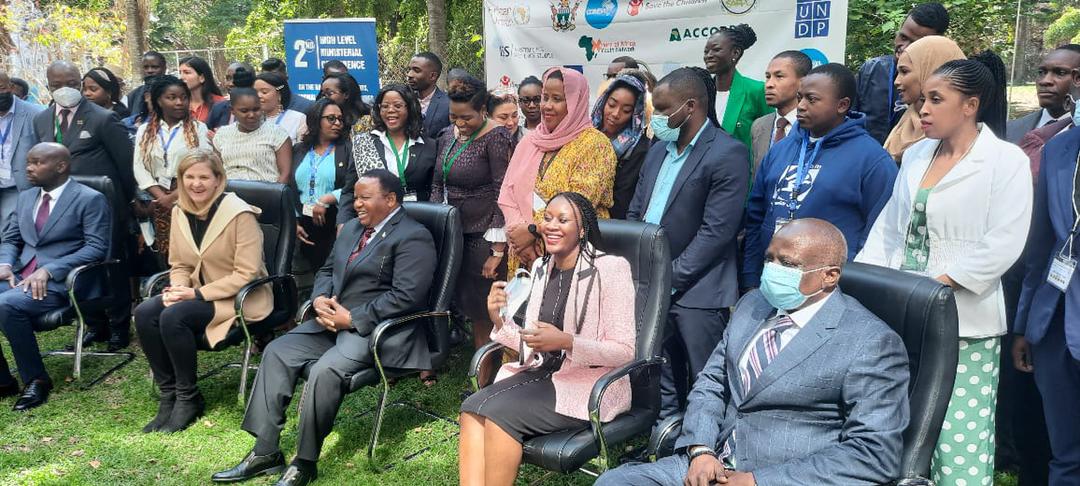|
Getting your Trinity Audio player ready…
|
A High-Level Ministerial Conference was convened to put under the spotlight the role of Regional Economic Communities (RECs), Regional Mechanisms (RMs), and Governments in promoting the Youth, Peace, and Security agenda in Southern Africa.
Addressing delegates at the gathering, Mr. Edward Kallon, the United Nations Resident and Humanitarian Coordinator for Zimbabwe extended his appreciation to the Government of Zimbabwe for hosting the important event on youth whom he said not only the future but the present as well.
“I also wish to commend the exemplary partnership between the African Union and the Regional Economic Communities – SADC and COMESA – in charting out the course for the ‘Africa we want.’ The adoption of the historic UN Resolution 2250 (2015) was a watershed moment for the demonstration of commitment and political will by the Member States to place at the centre of discourse, the important and positive role that young people play in the maintenance and promotion of international peace and security,” Mr. Kallon said.
Globally, the youth demographic attest to the fact that stakeholders cannot afford to continue ignoring a group that represents more than half of the population, especially in developing countries, including those in Southern Africa.
“Our meeting here today is therefore an expression of the willingness to give space and recognition to the youth in their efforts to prevent all forms of violence (direct, cultural, and structural) and in conflict transformation in deeply polarized contexts.
“It will make a huge difference if all of us – the private and public entities, and civil society and institutions —including UN agencies— can pool our efforts to provide the tools and the necessary resources to transform the text into real policies and specific projects at national and community levels.”
The UN in Zimbabwe fully recognises and supports efforts by the Government of Zimbabwe to promote the Youth, Peace and Security Agenda as reflected in the AU Continental Framework on Youth, Peace, and Security.
Zimbabwe recognizes the role and participation of young people in peace and security through Section 20 (1) (b) of the Constitution, which upholds the fundamental human rights of youth to have access to opportunities for representation and participation in political, social, economic, and other spheres on life.
The UN senior official acknowledged the role that Agencies such as UNDP and UN Women have played in supporting national endeavours, including the proposed draft Roadmap for the development of a National Strategy on Youth, Peace, and Security for Zimbabwe. This is a critical area of focus in Zimbabwe given that more than 60% of Zimbabwe’s population is below the age of 25 years.
Mr. Kallon said there is an urgent need to harness the demographic dividend and make the youth the bedrock of Zimbabwe’s and indeed, Southern Africa’s development strides. He emphasised the need to strengthen youth’s social mobility opportunities in the region to stem the tides of irregular migration flows, involvement in criminality, banditry, drug abuse, xenophobia, and violent extremism. For this to happen, he said there is a need for an enabling environment of peace and security.
The Secretary-General of the United Nations, Antonio Guterres has been a vocal advocate for the need for Member States to address the roots and structures of violence preventively.
“Prevention must be key in all that we plan to do because it is cheaper and better than cure. In his 2022 report on Peacebuilding and Sustaining Peace, the Secretary-General affirmed that shifting investments towards the prevention of violent conflicts saves lives and resources, is cost-effective and protects development gains. He equally stated that progress towards achieving the 2030 Agenda for Sustainable Development requires the integration of peacebuilding and sustaining peace into efforts to build back better. Inclusive and sustainable development, anchored in human rights, gender equality and leaving no one behind, is the best defence against violent conflict.
“On the other hand, structural prevention requires an acceleration towards the achievement of the Sustainable Development Goals and a coherent focus on addressing conflict risks and drivers and enhancing social cohesion through investments in equitable delivery of social services, inclusive institutions, transparent management of natural resource revenues and equal economic opportunities,” Mr. Kallon added.
COVID-19 has underscored the importance of switching from crisis response to prevention and the need to better anticipate, prevent and prepare for major risks by having stronger legal frameworks, better tools for managing risks, more participatory, inclusive and gender- and age-responsive approaches, better data and proper financing of prevention and preparedness.
He assured stakeholders that the United Nations is pleased to see this step forward in the implementation of UN Security Council Resolution 2250, following incisive reflections on how best to advocate for more inclusive policies and increased participation and engagement of young people in decision-making in the Southern African region.
“I have no doubt that with the calibre of youth representatives we have here, you will leave no stone unturned in proposing tangible initiatives that will contribute to the needed paradigm shift that will begin to unlock the massive potential in the African youths. Indeed, it is time to swing to action and walk the talk.
“I cannot end without expressing my delight with the fact that the continental Youth Envoy, Mrs Chido Mpemba and the Youth Ambassador for Southern Africa, Ms Cynthia Chigwenya are all daughters of Zimbabwe. I say congratulations to both, and all youths attending this conference. It is a vivid demonstration that the future of peace and security in Africa cannot be achieved without the young women of this beautiful continent. The UN stands ready to deepen our partnership with you all and to support this effort in a quest to ensure that no youth is left behind,” the respected diplomat said.
